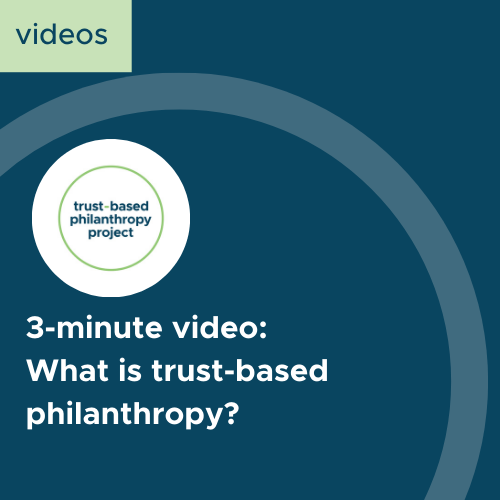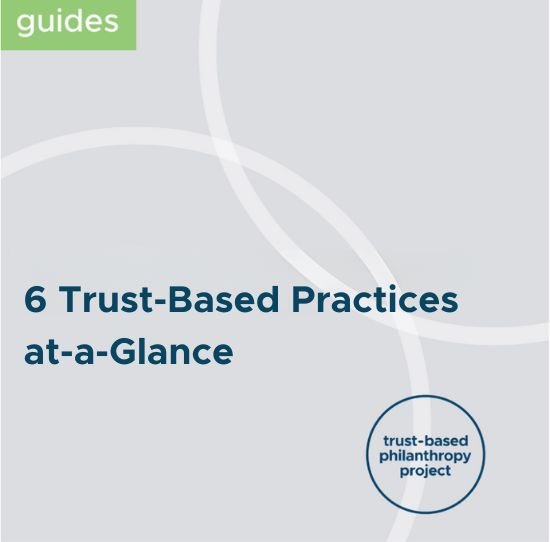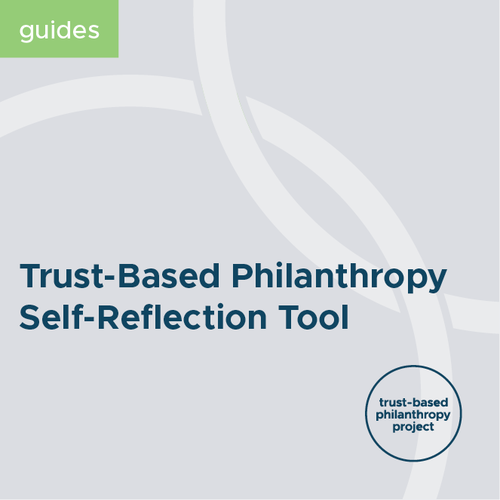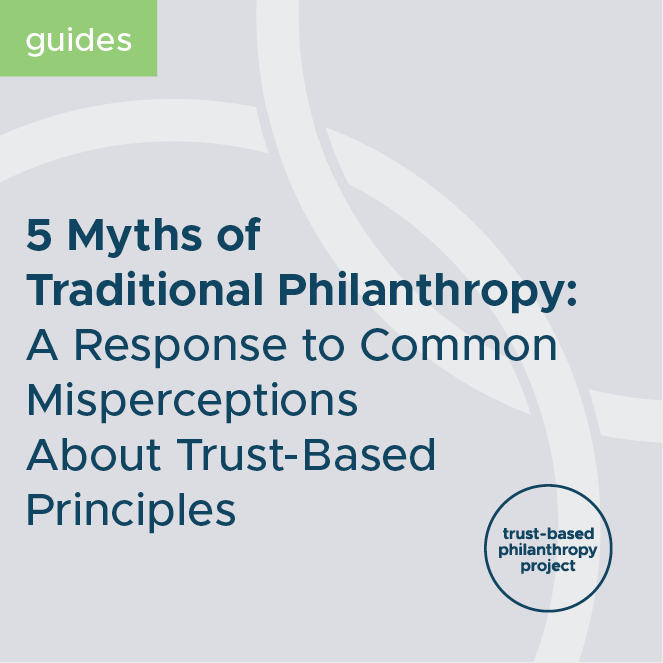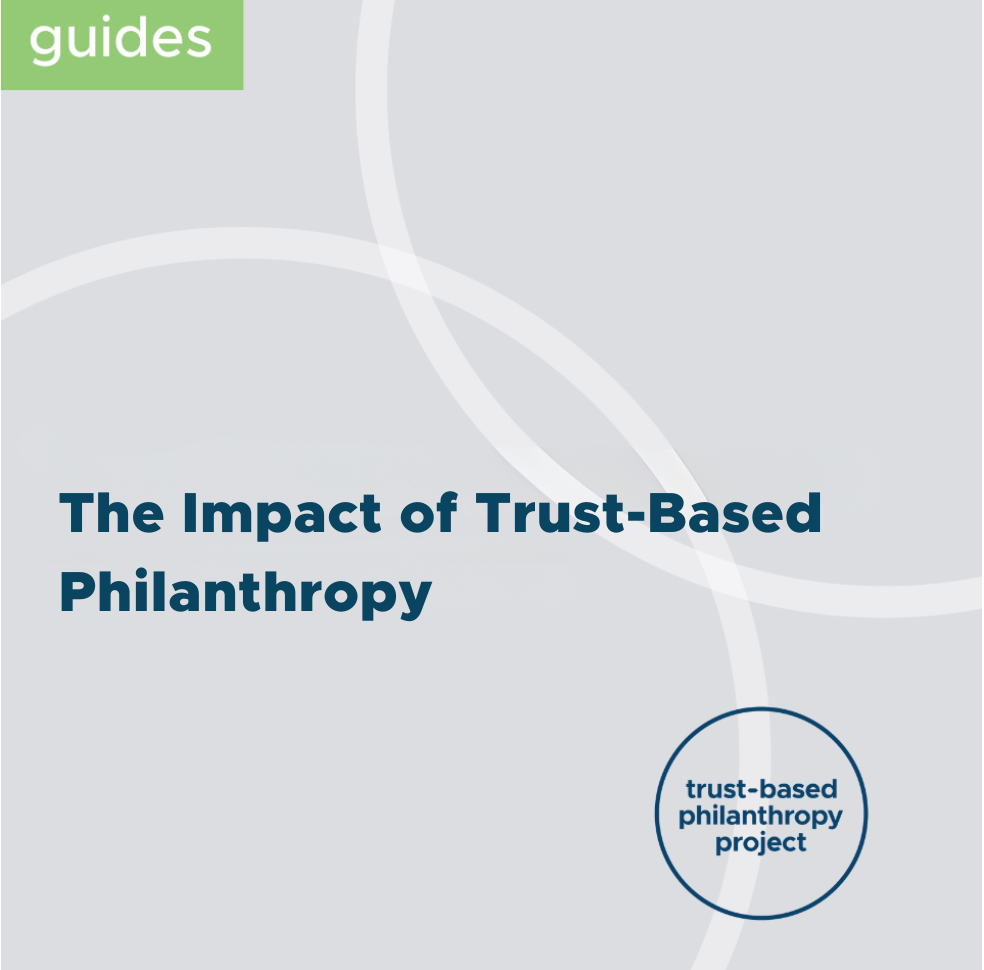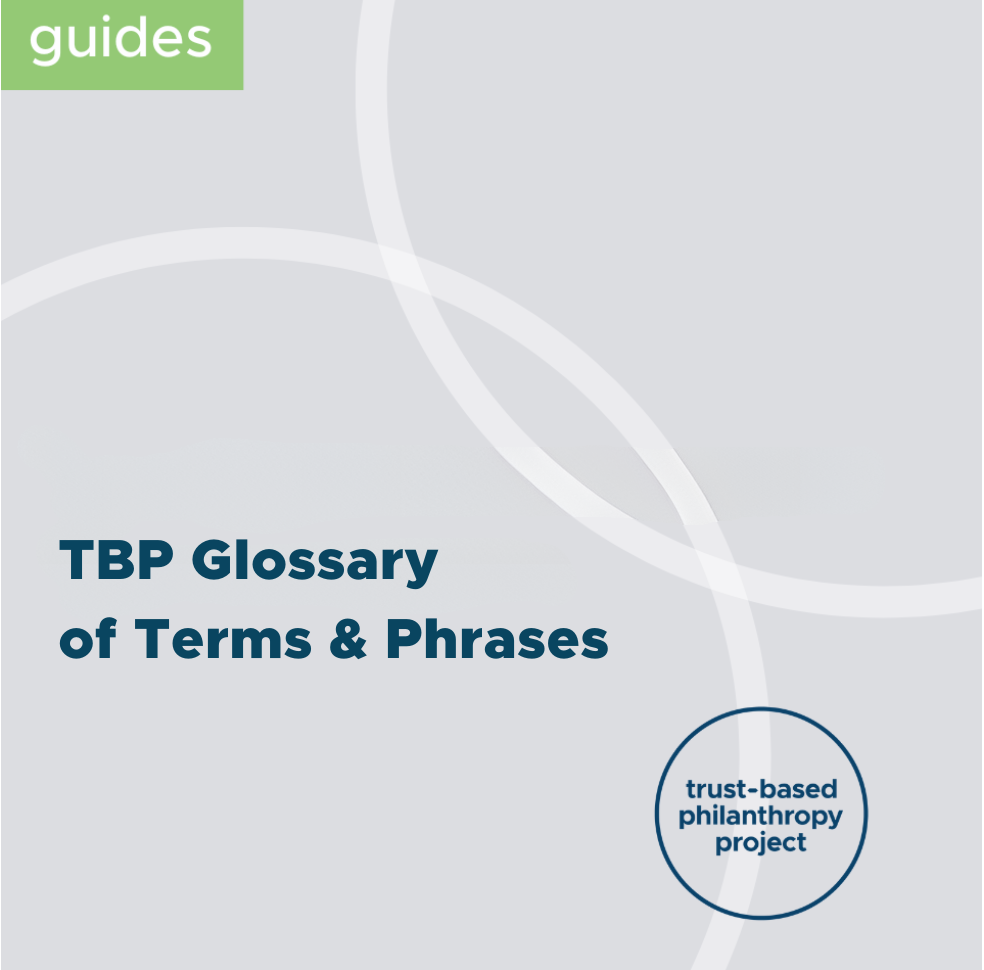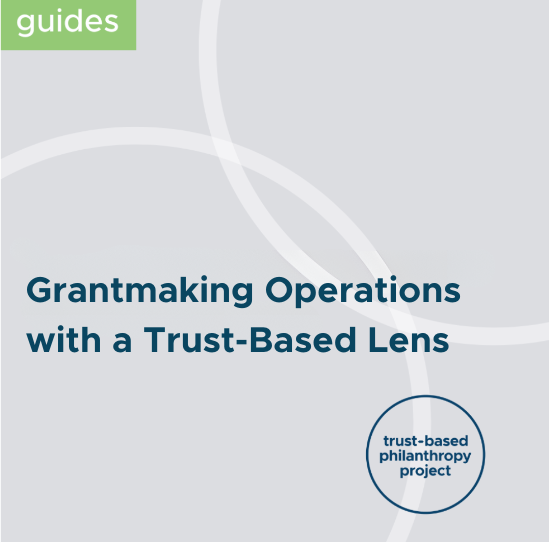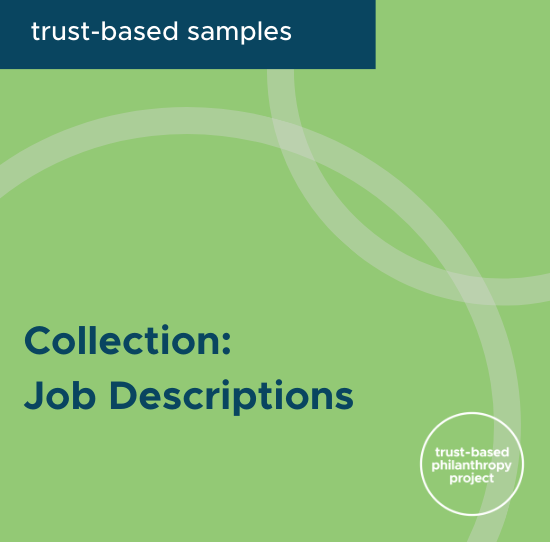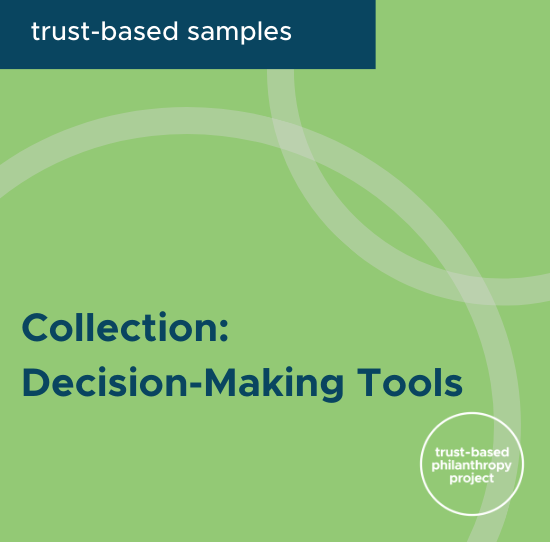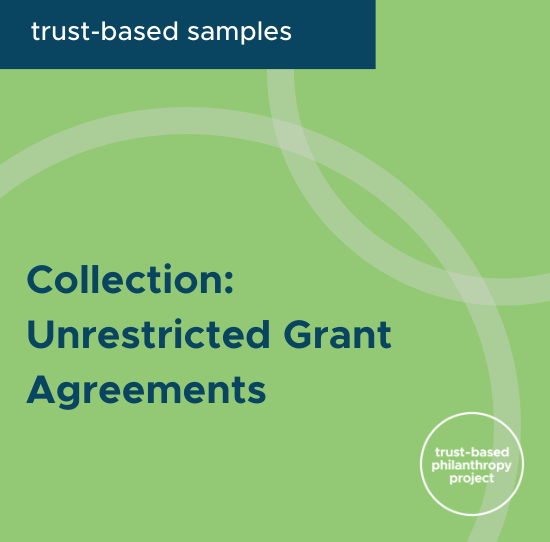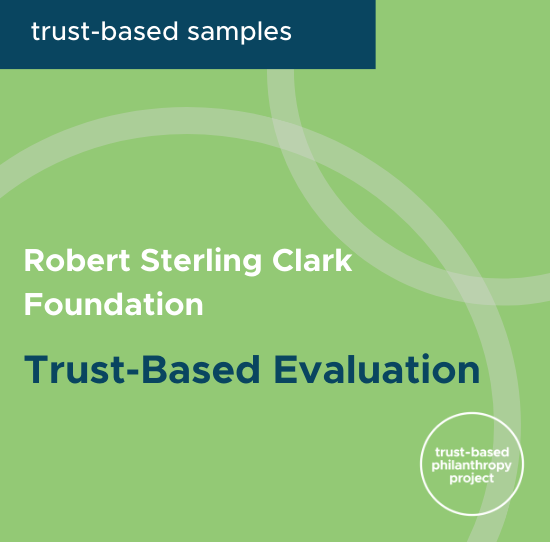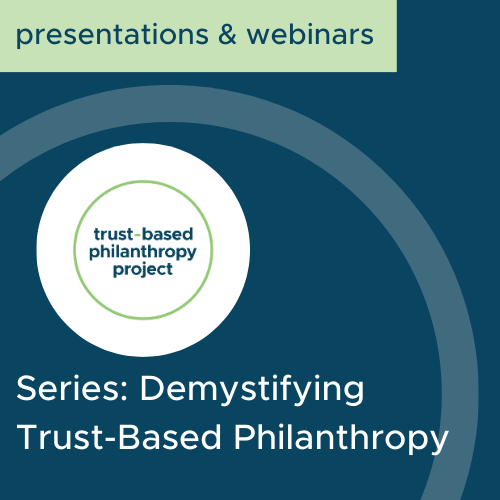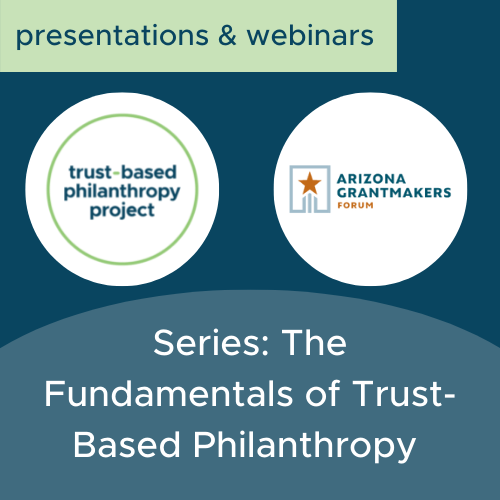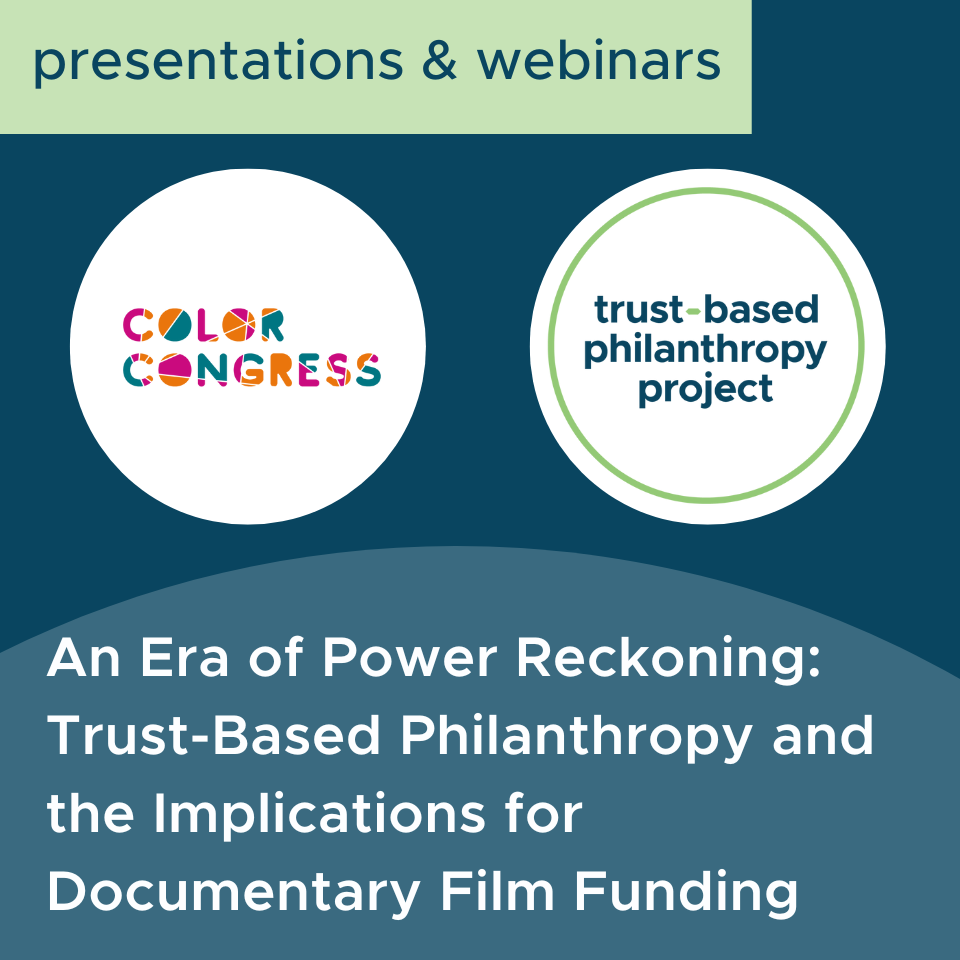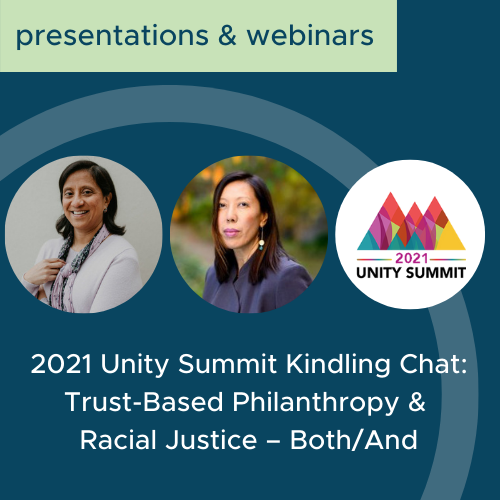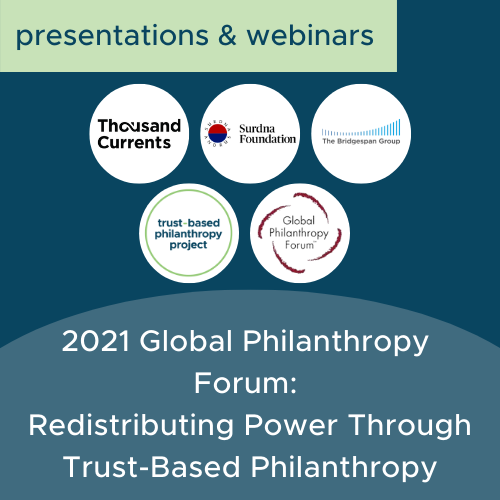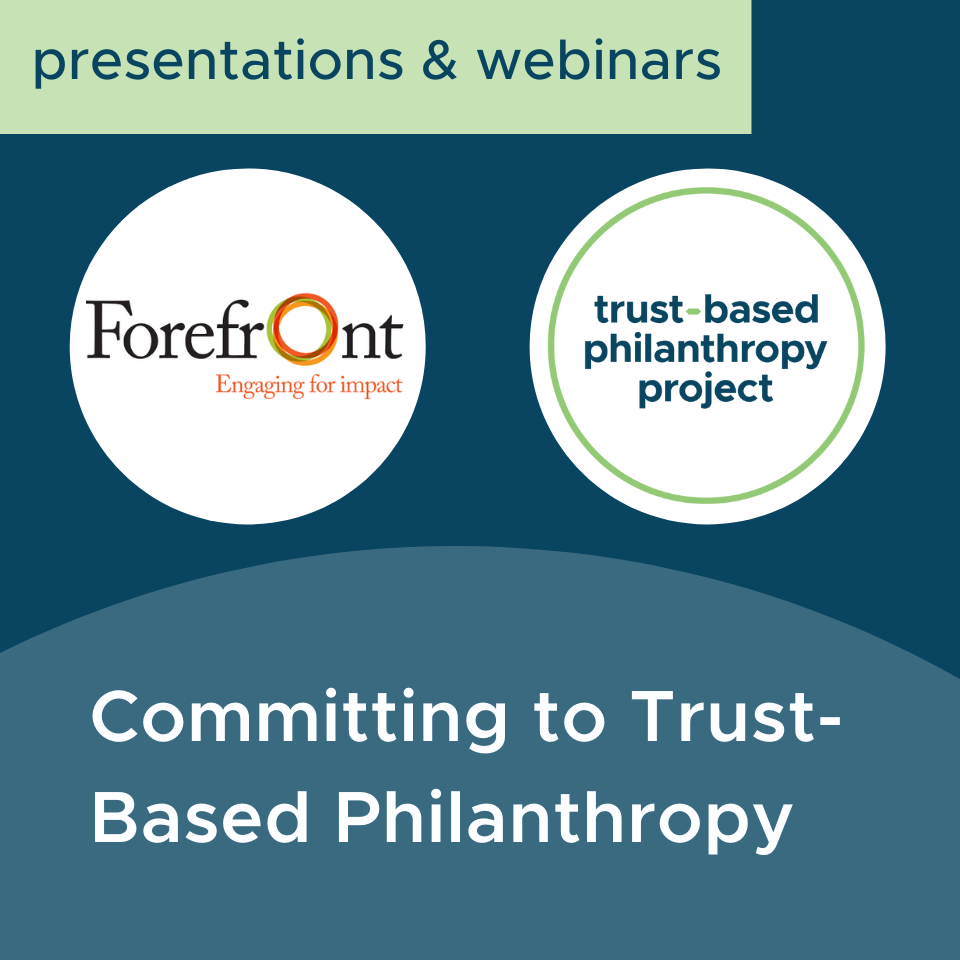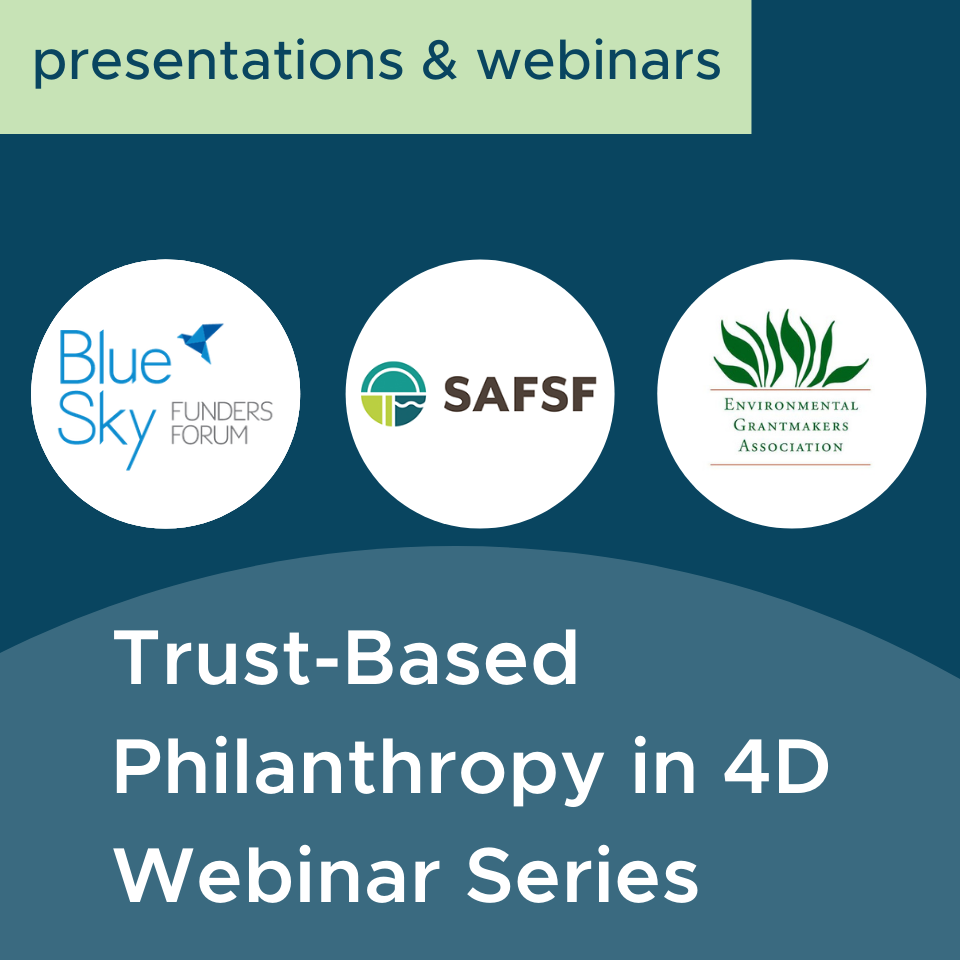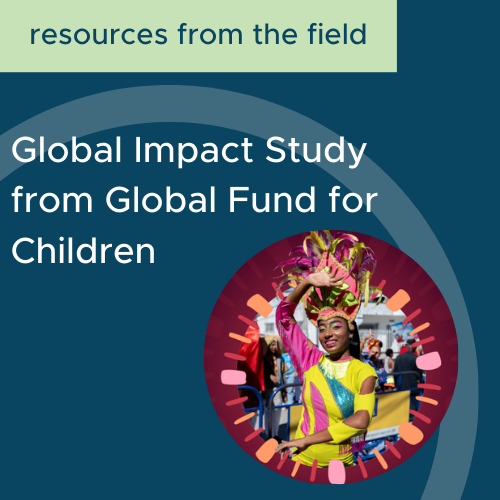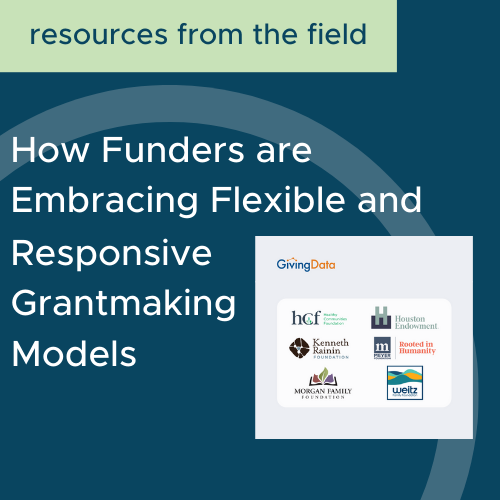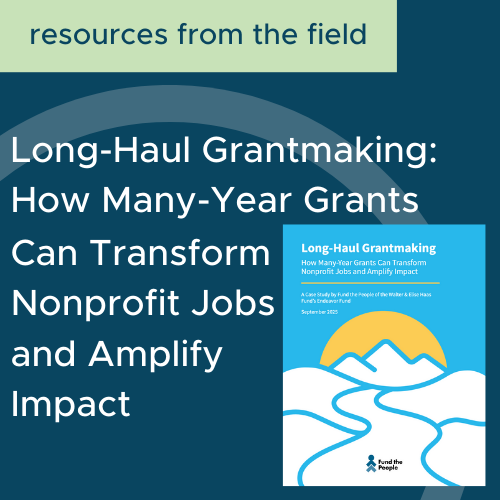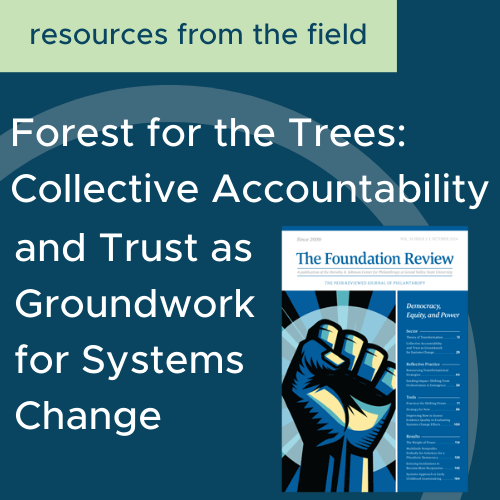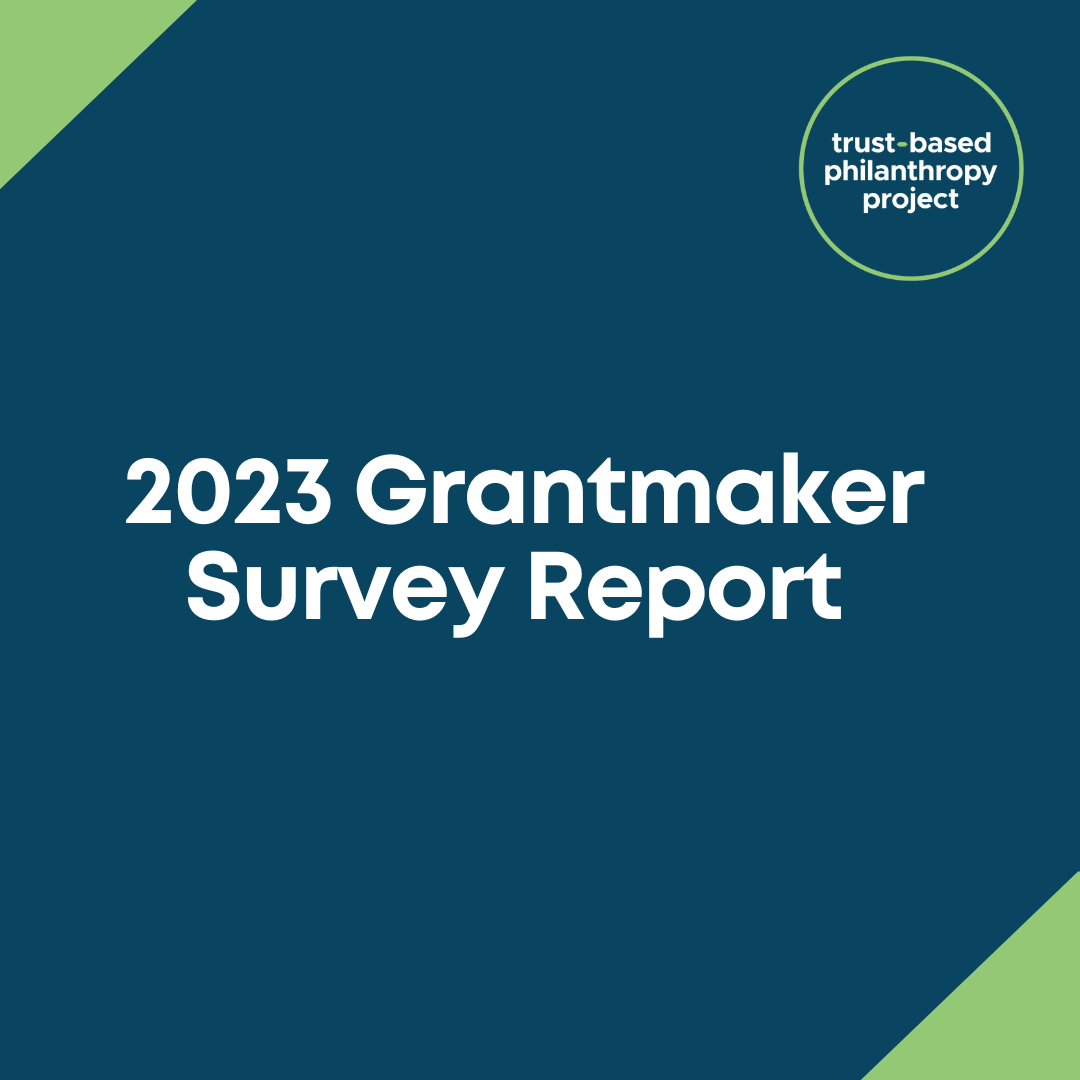Tools & Resources
Below you’ll find how-to guides about operationalizing trust-based philanthropy, videos and recordings from past presentations, samples from trust-based funders, publications from partners in the field, and our own research and reports about the trust-based philanthropy movement. Whether you’re a long-time practitioner or brand new to trust-based philanthropy, we hope these tools will help you along your journey.
Note: By using or accessing materials produced by the Trust-Based Philanthropy Project, you’re agreeing to the spirit and terms of our user agreement. If you have questions or would like to share feedback on how we can improve your accessibility, please contact hello@trustbasedphilanthropy.org.
Fundamentals
Don’t know where to start? Here are our most popular, go-to resources.
See all the fundamental tools here.
New to trust-based philanthropy? This 3-minute video walks you through the core of the trust-based philanthropy approach.
This guide provides a 2-page overview of the trust-based philanthropy approach, including the six practices of trust-based grantmaking.
While two institutions may share the same mission, how they carry it out can vary widely. Trust-based philanthropy flips the script on conventional philanthropy by promoting a culture of sharing power, centering relationships, and fostering mutual accountability. While the two approaches are not always diametrically opposed, this overview highlights some key areas of distinction wherein trust-based philanthropy reimagines conventional norms.
This guide is intended for grantmaking practitioners who are ready to live into their values to cultivate trust-based philanthropy holistically, across the four dimensions of this work: culture, structures, leadership, and grantmaking practices.
This self-reflection tool is designed to help funders at various stages of the trust-based journey examine how trust shows up across your organization, and identify areas that may need more inquiry, refinement, or deepening.
This guide offers insights and practical recommendations on shifting from traditional to trust-based grantmaking.
This guide outlines five common myths and misperceptions that come up in discussions about trust-based principles, and offers clear counterpoints in response.
This guide gives an overview of the impact made possible when shifting to a trust-based approach, including impact on nonprofits, funders, communities, and the social sector. Trust-based funders are consistently seeing various opportunities for reflection, assessment, and positive outcomes–painting a bigger-picture of the positive impact on organizations and the social sector ecosphere.
This guide outlines five common myths and misperceptions that come up in discussions about trust-based principles, and offers clear counterpoints in response.
This two-page guide, invites you to reimagine the program officer role in a radically different way - away from conventional norms of compliance and oversight, and towards trust-based norms of partnership, collaboration, and service.
Look through this guide to find a compilation of the most commonly used terms and phrases used in the context of trust-based philanthropy and their definitions.
This one-pager provides a simple venn diagram of the similarities and differences between trust-based philanthropy and racial equity.
This guide provides insight on what it really means to do the homework and outlines action steps funders can take to meaningfully incorporate this practice in their organizational structure, culture, and relationships.
This one-pager outlines concrete steps funders can take today in their organization’s culture, structure, and leadership to support their grant partners beyond the check
This guide provides a 2-page overview of the trust-based philanthropy approach, including the six practices of trust-based grantmaking.
While two institutions may share the same mission, how they carry it out can vary widely. Trust-based philanthropy flips the script on conventional philanthropy by promoting a culture of sharing power, centering relationships, and fostering mutual accountability. While the two approaches are not always diametrically opposed, this overview highlights some key areas of distinction wherein trust-based philanthropy reimagines conventional norms.
This guide draws on the experiences of funders who have applied a trust-based lens to their grantmaking operations to identify the key ways that grantmaking practitioners can operationalize their grantmaking processes in ways that center the needs of their grant partners.
Templates & Samples
Looking for concrete examples of how other funders have implemented trust-based practices in their organizations? Check out these samples from a range of trust-based foundations, and consider ways you can apply these to your own work.
See all templates and samples here.
A values-informed definition of “fiduciary responsibility” helped the Sewall Foundation’s board and staff align on their respective roles and guide their decision-making toward social impact.
These sample variety of job descriptions offer guidance for funders seeking to incorporate trust-based values in their staff roles.
This collection of welcome letters from Thousand Currents and the Charlize Theron Africa Outreach Project (CTAOP) demonstrate how funders can lead with trust and center relationships when embarking on new grantee partner relationships.
Check out these trust-based decision-making tools designed to support the grantmaking decision process
These sample unrestricted grant agreements from the North Star Fund, the Dorot Foundation, and the General Services Foundation provide language that focus on reducing the burden on grantees through more streamlined processes.
These samples provide insight on streamlining and simplifying the grant reporting process for grantee partners.
This grant application from Durfee Foundation balances “doing the homework” with the particular considerations for funding new organizations.
Headwaters Foundation designed its GO! Grants to be quick turnaround, high-impact, low-stress mini grants. This application takes less than an hour, and enables grants to be turned around in less than a week.
Videos & Recordings
Watch, read, or listen to videos, presentations, and discussions that cover everything from redesigning the philanthropic sector, to a deep dive into each of the trust-based practices.
See all presentations and webinars here.
The Trust-Based Philanthropy Project, in community with our network of ambassadors and advocates, gathered for a special virtual event celebrating our 5-year anniversary.
In this session, we reflected on highlights and lessons of our first five years, shared our thinking about our next chapter, and dreamed with you about the possibilities for a trust-based future.
In this six-part webinar series, the Trust-Based Philanthropy Project and featured speakers address common questions, clarify misconceptions, and explore ways to overcome obstacles in implementing trust-based philanthropy.
This two-part series, a partnership between the Trust-Based Philanthropy Project, Philanthropy Northwest, and the Iowa Council of Foundations, is designed for community foundations that are actively working to embrace trust-based philanthropy. This series explores how trust-based philanthropy plays out in the unique context of community foundations working at the intersection of grantmaking, fund development, donor relations, and community leadership
This two-part series dives into the six practices of trust-based philanthropy and the culture, structures, and leadership necessary for funders to bridge the values-to-practice gap and embody a trust-based approach.
How does trust-based philanthropy apply to film and arts funding? In this webinar, featuring the latest research on the state of film funding, three funders share how they are implementing trust-based practices and what they're learning along the way.
This webinar explores what it takes to build trust within a participatory framework, and how to bolster the strengths of trust-based philanthropy and participatory grantmaking—while also mitigating their tensions and challenges.
In this breakout conversation at Unity Summit 2021, Pia Infante of the Whitman Institute and Brenda Solorzano of Headwaters Foundation discuss the deep links between trust-based philanthropy and embodying values of equity and racial justice.
In this breakout session of the 2021 Global Philanthropy Forum, two trust-based funders describe the organizational structures and mindsets, rooted in trust, required to alleviate the power dynamic between funders and nonprofits.
Presented in partnership with Forefront Illinois, this webinar features a conversation with three foundation leaders on how trust-based philanthropy shapes extends beyond grantmaking practices into organizational values, culture, and leadership.
Publications
This curated collection of publications and tools from our partner organizations across the philanthropy sector offer complementary research, insights, and strategies to support funders interested in trust-based philanthropy and other efforts to redistribute power and resources.
See all publications here.
After co-leading the Durfee Foundation for decades, Carrie Avery, former president, and Claire Peeps, former executive director, share the lessons they gleaned from their succession planning and transition processes.
In times of upheaval, high-quality listening helps nonprofits and funders adapt quickly to the real needs of their communities, respond effectively, and build lasting trust and resilience. This guide, from Feedback Labs, offers advice, examples, and resources for how funders can best listen to grantees and communities in moments of uncertainty.
This contribution from Grassroots International expands on the work of trust-based philanthropy, situating trust as integral to the relationships we need among funders, movements, and allies to steward the transformation that our visions for justice require, both within philanthropy and beyond.
Using rigorous participatory methodologies for their 2025 Global Impact Study, the Global Fund for Children found that flexible funding, non-financial support, and trusting relationships contribute to partners’ growth and sustainability, enabling partners to create meaningful change in their communities.
To understand the growing shift toward flexible and responsive grantmaking, our friends at Giving Data invited six foundations to share how they define responsive grantmaking, what flexible funding models they’ve implemented, and how they are aligning their processes to better support grantees.
In this independent report by Fund the People, the Endeavor Fund serves as a mid-stream case study for how many-year grant commitments are key to building strong organizations with well-supported staff who can maximize impact on their communities.
To meaningfully address gender inequality and progress toward the UN’s SDGs, this paper explores how global health philanthropy can depart from its funder-driven model and move toward a vision where decolonial, feminist advocates drive long-term strategic thinking, intersectionality, trust-based funding, and community-led solutions.
In this Foundation Review article, Shaady Salehi and Pia Infante unpack the meaning of accountability in a trust-based philanthropy context: relational accountability—through reciprocity and trust in the funder-grantee relationship—as well as collective accountability to the communities being served.
This guide highlights the challenges faced by community-based organizations and their priorities for change in philanthropy and global development. It examines how funders can strengthen trust, flexibility, and partnership in funding to nourish community-led change.
This guide provides a comprehensive breakdown of trust-based philanthropy as it applies specifically to giving circles. Included in the guide, you can find a list of frequently asked questions, outlines of concrete steps you can take, and a list of additional resources
Research & Reports
The Trust-Based Philanthropy Project regularly conducts assessments of how trust-based philanthropy is being understood, adopted, and experienced, and offer analysis of how the movement is evolving and growing. Explore our research and reports below.
This 1-pager breaks down the latest federal actions (as of September 2025), how those actions will affect people across the U.S., and the ripple effects on nonprofits that so many of us rely on.
Our 5-year impact report details key aspects of the Trust-Based Philanthropy Project’s evolution from an awareness and organizing campaign into a dynamic movement that has laid groundwork for profound culture change across the philanthropic sector.
Our analysis of how funders are understanding, operationalizing, and grappling with trust-based philanthropy, what changes they have made and sustained since 2020, and what obstacles they may be facing. Based on 2024 survey data from 573 grantmakers.
An analysis of top motivations for pursuing trust-based philanthropy, organizational shifts to trust-based practices and operations, and contributing factors for organizational change. Based on 2023 survey data from 396 grantmakers on the trust-based philanthropy journey.
Key trends from 2022 discussions with nonprofit executive directors about whether and how they were experiencing shifts in power dynamics in their funder relationships.
An analysis of which aspects of trust-based philanthropy are most resonant for grantmakers on the TBP journey, which tools and resources have been most effective, and the top challenges and misperceptions related to trust-based philanthropy. Based on survey data from 141 grantmakers on the trust-based philanthropy journey, gathered in 2022.

